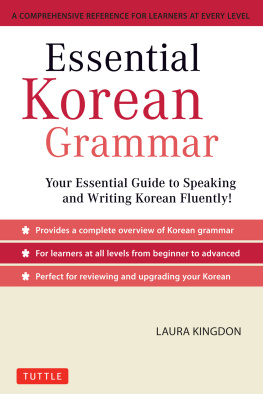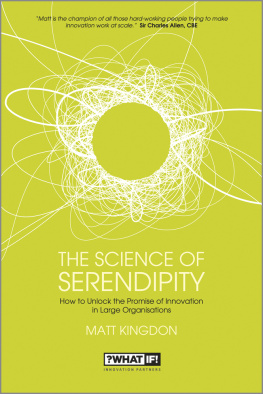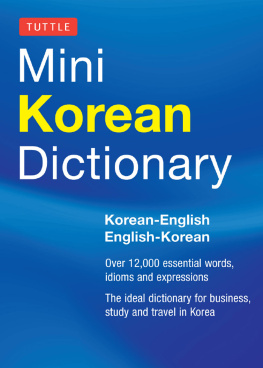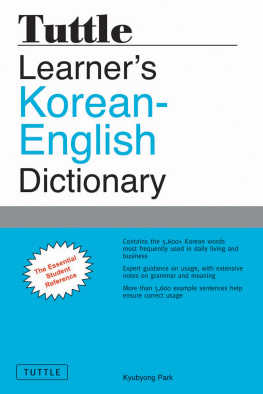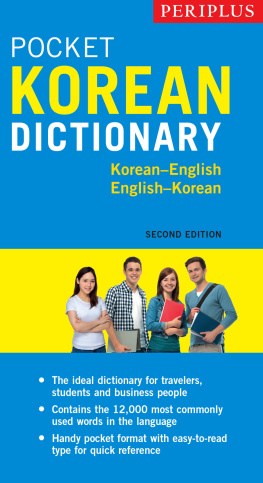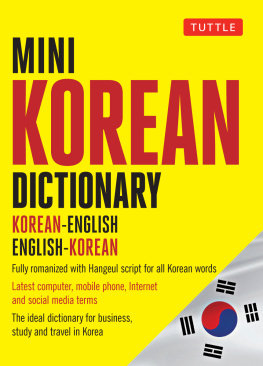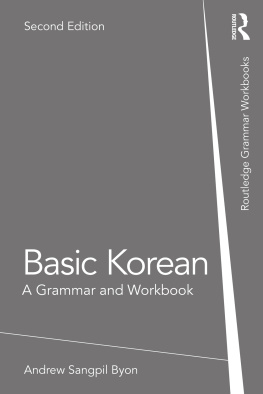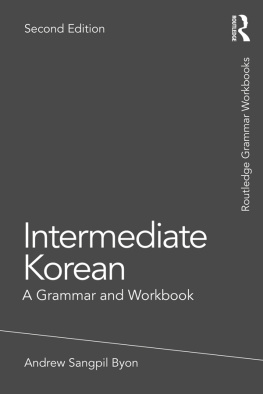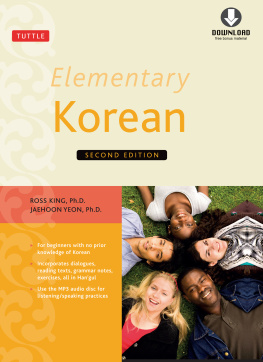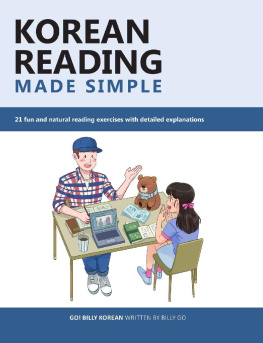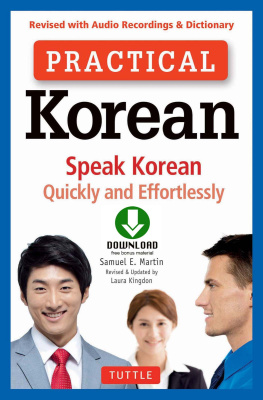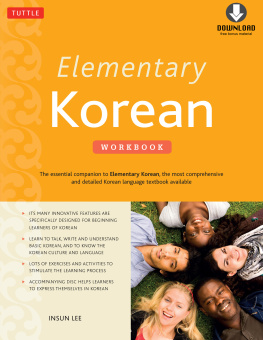Acknowledgments A lot goes into writing a book. This one started with my parents, David and Anita Kingdon, and their emphasis on the value of education and learning, a value I myself have pursued throughout my life. I am grateful for their constant support, as well as that of my brothers, Robbie and Andy Kingdon, and my best friend and surrogate brother, Randal Blandon. Finally, this book wouldnt have been written without the love, support, and constructive suggestions of my husband, Chris Backe; I had wanted to write this for years, but he was the one who finally inspired me to get it started, and kept me supplied with enough encouragement to stick with it once Id started. Of course, I also have to thank Tuttle Publishing for their work in publishing this book, not to mention the many other books theyve published that have been of use to me in my own language studies. Regarding this book in particular, I am grateful to Eric Oey for getting the ball rolling, to my editors Sandra Korinchak and Nancy Goh, to Mike Page for marketing, to Terri Jadick for general assistance throughout the process, and to all others who worked behind the scenes to make the book a reality.
My Korean editors Sanghyun Ahn and Hannah Han were instrumental in making sure all the Korean in the book was correct, and I also have to thank my former Korean tutor Kyehyun Park and all my professors at Yonsei for their instruction. Finally, Id like to thank Gordon and Ruth Kingdon, Bill and Joan Brown, Murray and Christine Brown, Beth Lloyd, Euen Moore, Bruce McAuley, Becky Strople, Dave Cook, Jan Barkhouse, Mark Currie, Jon Watts, Carolyn Watts, Lisa Wadden, Ed Charlton, Ian MacK-enzie, Stacey van Dyk, Rachel Davison, Dan and Elizabeth Rolfe, Alex Kennedy, Steve Fehr, Paul Benjamin, Amy Bowler, Bob Adamson, Luke Roberts, Azrael Jeffrey, Debbie Kim, Chelsey Mathews, Aaron Seymour, Bill Carver, Emma Chaitongkao, Holly Sroymalai, Ken May, Matthijs van Rooyen, Christian Frech, Park Chansoon, Lee Kayoung, Peter Daley, Jessica Suchan, JD DeLemont, and everyone else who has supported me along the way.
Appendix 1:
How to Sound Like a Native
Adverbs of Time Most adverbs are made using or ; see page to find out how that works. However, there are a significant number of very useful adverbs that dont follow these patterns. Theyre summarized below.
| iljjik | early |
| ildan | once, first of all |
| biroso | at last, for the first time |
| dolyeon | suddenly |
| gapjagi | suddenly |
| byeolangan | suddenly |
| neudateopsi | suddenly |
| dduk | (something was done) suddenly |
| eoneudeot | before we knew it |
| eoneuse | before we knew it |
| naengkeum | immediately |
| dangjang | immediately |
| eolleun | quickly, promptly, eagerly |
| ppali | quickly, promptly, eagerly |
| geupi | quickly, promptly, eagerly |
| jeuksi | quickly, promptly, eagerly, immediately |
| got | quickly, promptly, eagerly, immediately |
| geumse | instantly, at once |
| geumbang | instantly, at once |
| baro | at once, immediately, directly, straight, right, exactly |
| sero | newly |
| imi | already |
| beolsseo | already |
| ganbam | last night |
| eoje | yesterday |
| oneul | today |
| geujeokke | the day before yesterday |
| naeil | tomorrow |
| more | the day after tomorrow |
| dangil | the same day |
| dongsie | simultaneously |
| hankkeobeone | simultaneously, all at once |
| hwak | (to do something) completely, all at once |
| tteungeumeopsi | all of a sudden |
| majimak | the last |
| deudieo | finally |
| machimne | finally |
| gyeosok | continuously |
| dangbungan | for the time being |
| hancham | for some time |
| seulseul | gradually, taking ones time |
| yeote | still, so far, yet |
| ajik | still, so far, yet |
| mak | just now |
| banggeum | just now |
Adverbs of Frequency
| () pyeongso(e) | usually, ordinarily, always |
| neul | always |
| hangsang | always |
| eonjena | always |
| eonjejjeum | always |
| gyesok | continuously |
| ggeunimeopsi | continuously |
| jakku | often, incessantly, persistently |
| binbeoni | frequently |
| jaju | often |
| susiro | frequently, often |
| gakkeum | sometimes |
| ganhok | sometimes, occasionally |
| ittageum | sometimes |
| jongjong | sometimes, often |
| ttuieomttuieom | occasionally |
| deumundeumun | sometimes, occasionally |
| teumteumi | at spare moments |
| gyeolko | never, by no means |
| jeoldero | never, by no means |
Adverbs of Degree None
| jeonhyeo | not at all |
| jeoldero | never, absolutely not |
| domuji | entirely, never (with negatives) |
| tong | entirely, never (with negatives) |
Not much
| ojik | only |
| jeokeodo | at least |
| geuri | not much |
| geudaji | not much |
| jomcheoreom | rarely, not easily (usually with negative expressions) |
| salmyeosi | furtively, secretly |
| ppadeutsi | barely, narrowly |
| beonjjeok | lightly |
| gyeou | hardly |
| deol | not much, less than |
| yeogan | rarely, not much (used with the opposite of whatever youre really trying to say) |
Some
A lot
| deo | more |
| heunhi | commonly |
| ggue | fairly, much |
| ggwae | (to rest) deeply, soundly |
| teuki | especially |
| mucheok | very |
| eojjina | so |
| hweolssin | greatly, by far, much |
| maen | first, most, very |
| yunanhi | especially |
| hado | too |
| gipi | deeply |
| wonak | originally, very, by nature |
Next page
